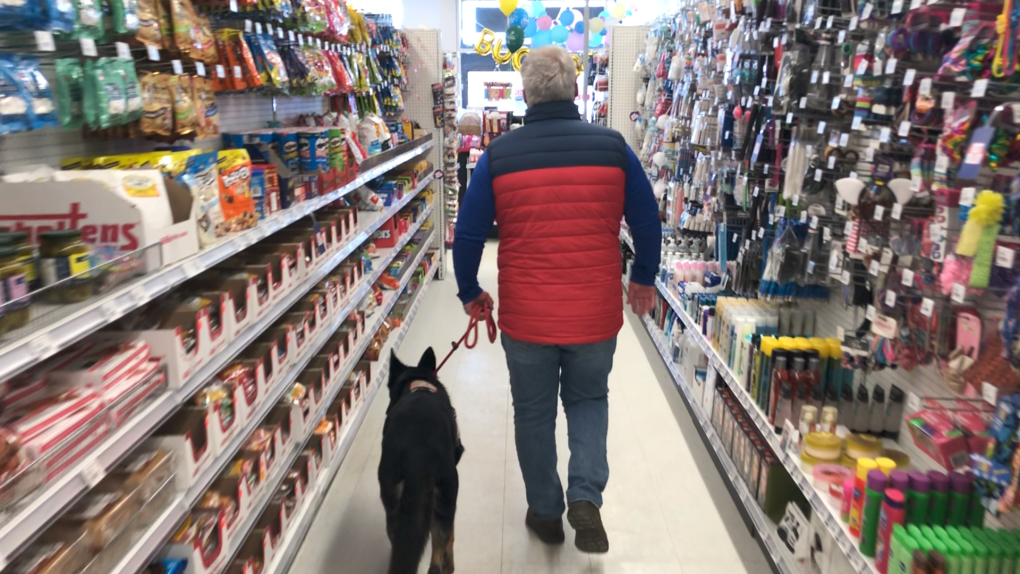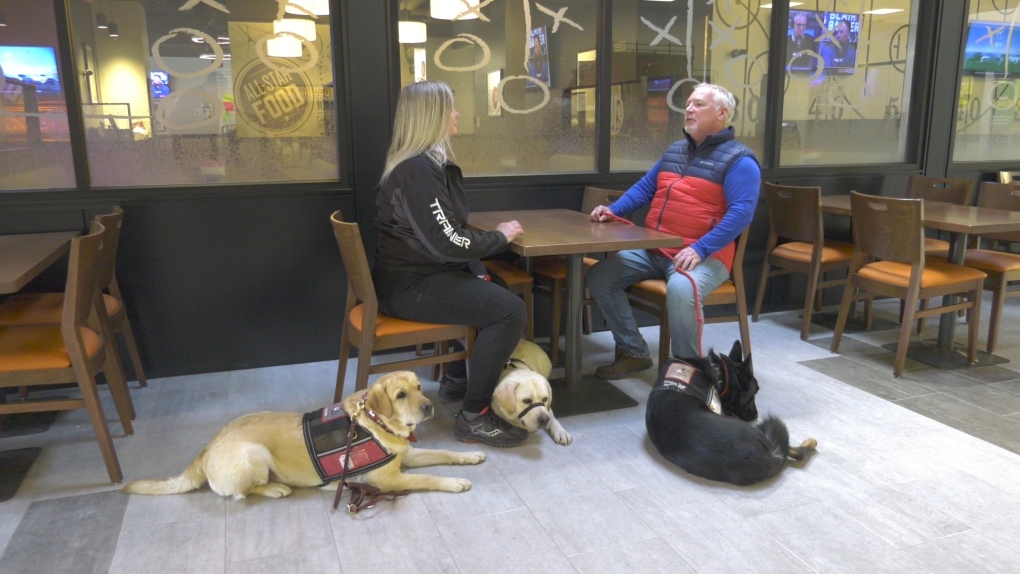Ability Dogs Canada to launch education campaign on service dogs
Service dogs are a great resource to help people suffering with mental health, anxiety, or mobility issues, but there are concerns coming from people who use them, saying the public should be educated on how to react when they encounter one.
Shawn Floyd has had his service dog, Honey, since she was a puppy. Now fully trained through Ability Dogs Canada, she helps him cope with PTSD suffered after a career in law enforcement.
"She's been fully certified for over a year. She's really helped me going to some large group settings and I can direct my attention when things get tense and anxious," Floyd said.
"At home, she's company. When I start to get anxious, she'll lay down next to me or I just feel her next to me as a sort of source of reassurance."
But Floyd says he's experienced unnerving situations while out in public places with his service dog.
"Unfortunately, my dog has become a bit of a beacon when I go out into the public," he said. "I've had people come into my space, very close, and started to ask history as to why I have the dog or what the dog is for. I don't even know this person!"
Floyd says he's even had people attempt to pet or feed Honey, causing more stress and anxiety in the situation.
"It has become, unfortunately for me, very frustrating at times where I felt I didn't want to bring my dog into the store or into a location because I didn't want that attention," he added.
 Shawn Floyd and his service dog, Honey, walk through the aisle of a store. (Nate Vandermeer/CTV News Ottawa)
Shawn Floyd and his service dog, Honey, walk through the aisle of a store. (Nate Vandermeer/CTV News Ottawa)
Samantha Cooper is the founder of Ability Dogs Canada, an organization that trains service dogs, and says she's received calls from handlers in the same situation.
"Somebody has come up and they say, 'Oh, I know I'm not supposed to pet the dog,' and then they start to reach," Cooper said. "What's happening is, specifically my PTSD people, they freeze and they are stuck in the store. Two individuals, I've had to go and help to get them out of the store because they are stuck."
That's why she is launching an education campaign, reminding people how to react when they see a service dog at work.
"My goal is to help educate when you see a team, what is appropriate and what is not," she added.
Cooper says a handler may use a service dog for many reasons, and the dogs are trained specifically for that person.
"They don't want the attention, and sometimes they experience disassociation or flashbacks while they are out and we teach the dogs to nudge them to help them get through that," she said.
"When the dog is distracted, sometimes the dog doesn't catch that the person is going into one of those episodes, so it creates a problem," Cooper added. "As much as they love animals, and their intentions are completely positive, they are affecting the person that is in need of the dog."
Cooper says it's important to remind people that when dogs are wearing their vests, they are working, and not to disturb them so their handlers can feel more comfortable.
 Samantha Cooper, left, and Shawn Floyd discuss the Ability Dogs Canada education campaign about service dogs. These dogs are named Shanka, Coby, and Honey. (Nate Vandermeer/CTV News Ottawa)
Samantha Cooper, left, and Shawn Floyd discuss the Ability Dogs Canada education campaign about service dogs. These dogs are named Shanka, Coby, and Honey. (Nate Vandermeer/CTV News Ottawa)
"You're not going to go up to somebody in a wheelchair and start talking about their wheelchair," Cooper said. "The person comes first. Just interact with them, smile at them, say hey, have a nice day, whatever you would do to anybody."
Floyd agrees, and hopes the message will stick and spread across the country.
"I don't mind somebody saying, 'You have a nice dog,' but at the same token, I would prefer that they can enjoy looking at the dog, let to keep walking without trying to talk to me," he said.
"It's not that I bring my service dog into a situation for the fun of it, she's there for a purpose for me," Floyd said. "If people can be aware of that, to leave the animal alone and let the person with the service animal just go about their business, it would make things so much better, for not only myself, but I'm sure for others with a service animal."
CTVNews.ca Top Stories

Young people 'tortured' if stolen vehicle operations fail, Montreal police tell MPs
One day after a Montreal police officer fired gunshots at a suspect in a stolen vehicle, senior officers were telling parliamentarians that organized crime groups are recruiting people as young as 15 in the city to steal cars so that they can be shipped overseas.
B.C. judge orders shared dog custody for exes who both 'clearly love Stella'
In a first-of-its-kind ruling, a B.C. judge has awarded a former couple joint custody of their dog.
Man sets self on fire outside New York court where Trump trial underway
A man set himself on fire on Friday outside the New York courthouse where Donald Trump's historic hush-money trial was taking place as jury selection wrapped up, but officials said he did not appear to have been targeting Trump.
Sask. father found guilty of withholding daughter to prevent her from getting COVID-19 vaccine
Michael Gordon Jackson, a Saskatchewan man accused of abducting his daughter to prevent her from getting a COVID-19 vaccine, has been found guilty for contravention of a custody order.
Mandisa, Grammy award-winning 'American Idol' alum, dead at 47
Soulful gospel artist Mandisa, a Grammy-winning singer who got her start as a contestant on 'American Idol' in 2006, has died, according to a statement on her verified social media. She was 47.
She set out to find a husband in a year. Then she matched with a guy on a dating app on the other side of the world
Scottish comedian Samantha Hannah was working on a comedy show about finding a husband when Toby Hunter came into her life. What happened next surprised them both.
'It was joy': Trapped B.C. orca calf eats seal meat, putting rescue on hold
A rescue operation for an orca calf trapped in a remote tidal lagoon off Vancouver Island has been put on hold after it started eating seal meat thrown in the water for what is believed to be the first time.
Shivering for health: The myths and truths of ice baths explained
In a climate of social media-endorsed wellness rituals, plunging into cold water has promised to aid muscle recovery, enhance mental health and support immune system function. But the evidence of such benefits sits on thin ice, according to researchers.
'It could be catastrophic': Woman says natural supplement contained hidden painkiller drug
A Manitoba woman thought she found a miracle natural supplement, but said a hidden ingredient wreaked havoc on her health.
































